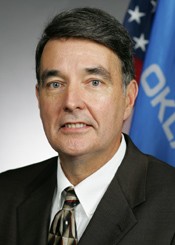Oklahoma Republican Representative Says “Blood Money” From Drug Industry Killed Anti-Meth Bill

Republic Report earlier reported that the Consumer Healthcare Products Association (CHPA), an industry group representing over the counter drug makers, spent a whopping $194,957.76 in Kentucky in January alone lobbying against stricter regulations on the sales of certain cold medicines that can be used to produce methamphetamine.
The CHPA is also lobbying heavily in Oklahoma, and scored a victory earlier this week when the House Public Health Committee there defeated a bill along a 7-6 vote that would’ve enacted regulations similar to the ones Kentucky legislators are proposing. Rep. Doug Cox (R), a supporter of the bill, blamed the defeat on “blood money” from Big Pharma:
“This is blood money for the pharmaceutical industry,” Rep. Doug Cox, R-Grove, told lawmakers before the vote was taken. After the vote, Cox, a physician, said he didn’t know how he would be able to look police officers, social workers or prosecutors in the eye and tell them that the Legislature works for the public good.
Unfortunately, the Oklahoma Ethics Commission has yet to release the 2012 lobbying numbers, so it is unclear how much CHPA spent on lobbying the legislature against the bill during the months of January and February. However, gift disclosures do show that Pfizer — the manufacturer of Sudafed, long a target of anti-meth legislation — spent $99.47 on August 25th, 2011 on dining Rep. Colby Schwartz (R), one of the bill’s opponents whose votes killed it in committee.
Republic Report asked Cox about the lobbying forces that battled the anti-meth legislation. “The pharmaceutical industry is the main force, the main money trying to defeat the bill,” said Cox. “What really discourages me is they are not transparent.” He explained that the industry lobbies “by disguise,” setting up websites and running radio advertisements without disclosing that it is behind them. Cox told us that he didn’t think the pharmaceutical industry taking Schwartz or any other legislator to dinner would’ve influenced them, but a “$500 campaign contribution would influence their vote.”
Indeed, in Schwartz’s last run for office, drugmaker Eli Lilly was a strong supporter of his campaign, giving him $1,500. Pfizer gave him $500, as did GlaxoSmithKline, Hoffman-Laroche, and Johnson & Johnson. But Schwartz may have a deeper connection to the pharmaceutical industry than meals with Pfizer or campaign contributions. He spent six years before joining the Oklahoma legislature working directly for the industry as a sales representative.
Democratic Rep. Ed Cannaday, who also voted no, received a $250 contribution from Washington D.C.-based Merck lobbyists. GlaxoSmithKline gave $300 and Merck gave $250 to bill opponent Democratic Rep. Al McAffrey (it was one of his last votes in the House, he was just elected to Senate). Republican “no” voter Rep. Andy Grau nabbed $250 from Merck as well. Bill opponent Rep. Ron Peters (R) nabbed $800 from pharmaceutical manufacturers. Republican David Derby and bill opponent got $1,000 from drug manufacturers in his last campaign.
Whatever influenced these members of the Oklahoma legislature to vote against this anti-meth bill, one thing is certain: they came from different ideologies and from different parts of the state, but they all had strong financial ties to the pharmaceutical industry.